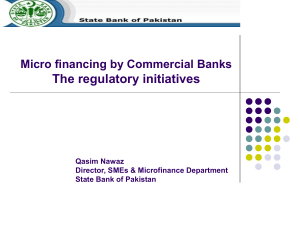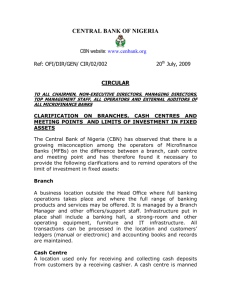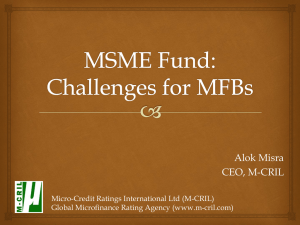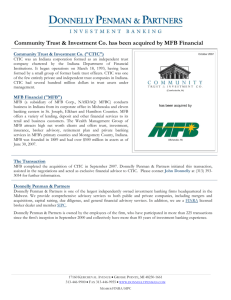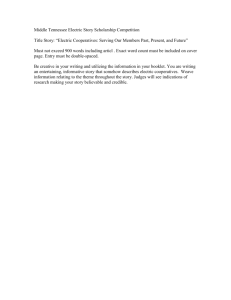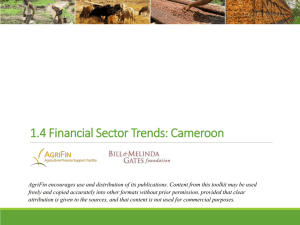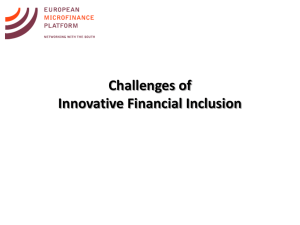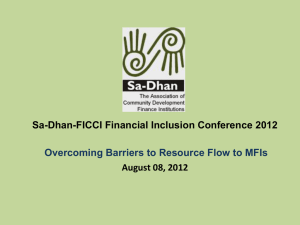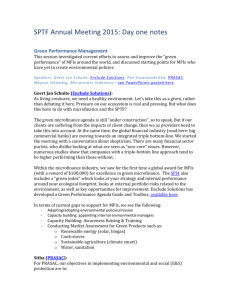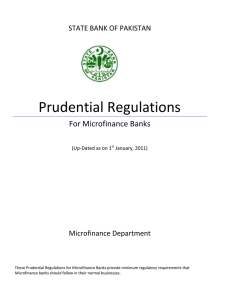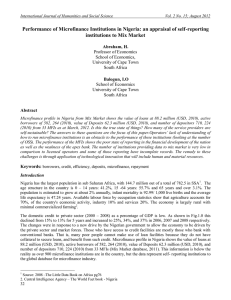Institution Building Of Mfbs
advertisement
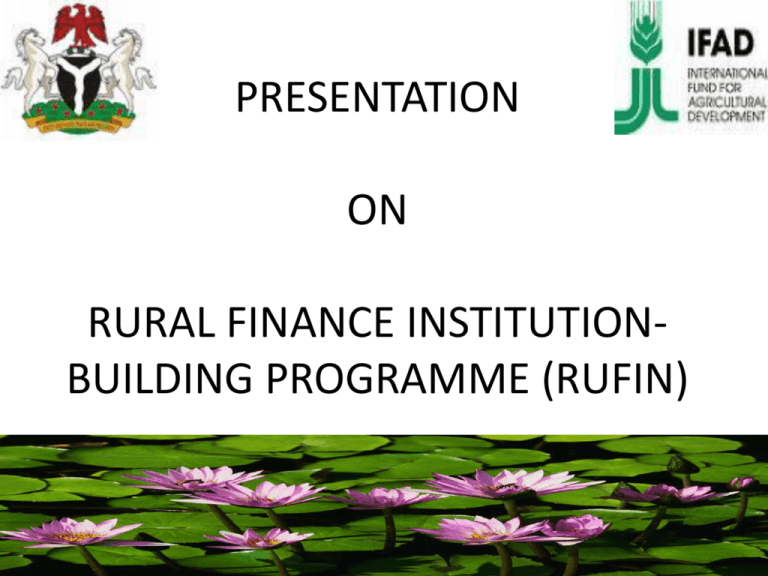
PRESENTATION ON RURAL FINANCE INSTITUTIONBUILDING PROGRAMME (RUFIN) What Is RUFIN Set Out To Do ? To Alleviate Poverty With A Particular Focus On The Rural Poor And Especially Women, Youths And The Physically Challenged What Is RUFIN All About? It’s a 7 year programme designed to • Develop and strenthen RMFI’s • CAPACITATE MFB’s • ESTABLISH LINKAGES BETWEEN rmfi,s AND FORMAL INSTITUTIONS • Creat viable and sustained rural financial system • Guarantee credit facility to RMFI by MFB & commercial banks • Refinance RMFIs through MFBs Expected Outputs and Targets • 408,000 households in 36 LG (11,000 per LG) of rural poor to be economically empowered • 72 new viable cooperative savings and credit union (COSACU) will be developed • 200 existing ones to be strengthened. • Establish & strengthen apex organizations for (MFBs) & (MFIs). • Over 1500 chairpersons, secretaries, treasurers, committee & ordinary members of the MFI’s to be trained. ….Expected outputs • Train women on enterprise analysis as basis for accessing credit from microfinance banks or MFIs • Train and promote women to take leadership roles in MFIs • Address legal and policy issues which discriminate against women in participating in cooperatives • RUFIN will promote member based MFIs by giving woman opportunity to form MFIs where they lead Programme coverage • 12 States – North Zone States: Bdamawa, Bauchi, Katsina, Zamfara – Central Zone States: Benue, Nasarawa, Lagos, Oyo – Southern Zone States: Anambra, Imo, Edo, Akwa-ibom • 3LG from each state • 36LG involved • 3 Zonal Offices – Northern Zone :- Kaduna – Central Zone :- Lokoja – Southern Zone :-Benin Access to Finance Model RMFIs Coops MFBs 345,000 families 138,000 womanheaded households small-holders, farmers, craftsmen and petty traders. Program Components Component 1: Develop MBRMFI Sub-component 1: Improve Policy, Legal & Institututional Framework For RMFI Sub-component 2: Capacity Building For MBRMI & Apexes Sub Component 3: Promotion Of Linkage Program Component 2: Institution Building Of Mfbs Sub-component1: Institution Building For Mfbs Sub-component 2: Capacity Building Of Non-bank Mfis Subcomponent 3: Support To NACRDB Sub-component 4: Implementation Support, Regulation & Supervision Of MFB Component 3: Framework For Microfinance Development Subcomponent 1: Access To Re-finance Facilities Sub -Component 2: Develop Apexes For MFBs & Umbrella Organizations Sub-component 3: Research And Documentation And Policy Dialogue Component 4: Program Management, Coordination, M&E Subcomponent 1: Establishment Of PMU Sub -Component 2: M&E And Policy Support To Implementation Project Finance SOURCE $’000 % TYPE IFAD 27,175.3 67.9 Loan IFAD 400.5 1.0 Grant FORD 500.0 1.3 Grant FGN 11,923.9 29.8 Equity TOTAL 39,999.7 100 RUFIN Stakeholder Roles CENTRAL BANK OF NIGERIA DFD, OFID & RSD • Policy coordination & improvement via MAB of DFD • Licensing of MFBs • Registration of non bank MFIs and RMFIs • Draw-up guidelines for self regulation • Develop guideline for formation of apexes • Data management and information systems • Linkage program • Establish and manage Microfinance Development Fund MDF SERVICE PROVIDERS • Training, mainstreaming & promotion of non-bank MFI & RMFIs linkage FEDERAL DEPT OF COOPERATIVES • Review and establish new national policy framework for RMIs, SGs, SACAs, COSASs and apex Organizations • Establishment of RMFIs, cooperative, savings and credit cooperative organisations (SACCOS), savings and credit associations (SACA), COSACS • Review curricula of cooperative training colleges & institutes • Manage study tours for cooperatives RUFIN Stakeholder Roles NAPEP • Support project implementation and monitoring • To link the target beneficiaries to the funds generated. • To plan, supervise and monitor the scheme • To develop credit products to support mf policies • To train staff to ensure timely implimentation, close monitoring and progress reporting. NACRDB • Support project implementation and monitoring • An initial assessment study of the bank operation with the view of reengineering/ empowering it to improve its operational efficiency and have a sustainable and better service to agric. And rural micro enterprise. • Training of relevant staff • Provision of technical support in the development of new products , strenthening old ones and other emerging banking technical issues that would enhance service delivery. NON-BANK MFIS • Provision of relevant mis facilities • Support project implementation and monitoring RMFIS • Support project implementation and monitoring Institutional Framework Stakeholders PMU CBN FDC NAPEP NACRDB MWA Banks MFIs RMFIs Licensed MFBs in Project States MFB Lagos Anambra Oyo Imo Edo Bauchi Benue Akwa Ibom Adamawa Zamfara Katsina Nasarawa Total % 159 86 46 41 25 12 12 11 8 6 5 3 414 CB – MFB 58 69 42 39 23 9 6 7 7 6 4 3 273 65.9 New 101 17 4 2 2 3 6 4 1 0 1 0 141 34.1 % 38.4 20.8 11.1 9.9 6.0 2.9 2.9 2.7 1.9 1.4 1.2 0.7 100.0 Cum % 38.4 59.2 70.3 80.2 86.2 89.1 92.0 94.7 96.6 98.1 99.3 100.0 MFB Intervention Model C Performance Monitoring B Market Refocusing A Growth & Outreach MFB Reform & Repositioning Eligibility & Selection – Expression of interest by the MFBs based on RUFIN terms and conditions – Rural & microenterprise markets focus – Focus on MFB’s willingness to reposition – Compliance based eligibility – Technical support based on agreed targets & performance milestones Comprehensive baseline institutional diagnosis – Capacity needs assessment – Participatory intervention plan – Microfinance banking repositioning plan On-going performance rating – PEARLS rating for cooperatives – CAMEL rating for MFBs MFB Reform & Repositioning Market, Methodology & manpower – – – – Product remix Process redesign Delivery methodology and process Growth and outreach milestones Regulation and Supervision – International performance and local regulatory standards • • • • Portfolio Efficiency Profitability Financial Structure – Sustained performance monitoring Key Issues 86% of the MFBs in four states namely Lagos, Anambra, Oyo, Imo & Edo. – What priorities for SPMUs – Pareto law? Few MFB partners in Nasarawa, Katsina, Zamfara, and Adamawa – Attracting MFB investment? – Expand outreach of existing ones Selection criteria for MFBs to differ in high & low concentration MFB states. This makes Cooperatives the most effective and even channel of outreach in all states Cooperatives Growth through mergers o 1-2 societies into 300-500 member societies o 1-4 societies into 1500-2000 unions o 1 CFA per state Develop professional management and governance Training and capacity building Improved savings Better management State of the States Letter Of Intent For Participation Commitment letter provided Commitment letter provided Counterpart Fund Office ADAMAWA Coordinating Ministry/Dept. Agriculture AKWA-IBOM Agriculture ANAMBRA Agriculture Provided Awka North; Ayamelum; Orumba North Approved but not released NA BAUCHI Agriculture Provided Ningi, Bauchi, Katagun NA BENUE Rural Development and Cooperatives Provided Apa; Logo; Gwer-West Approved but not released In process Provided EDO Agriculture Provided Etsako West,Orhiomwon, Esan North In process Acquired IMO Agriculture Provided Ezinihitte, Isiala Mbano, Ideoto Approved but not released Acquired Agriculture and Coperative Agriculture and Natural Resources Agriculture Natural Resources and Rural Development Agriculture Not Provided Epe; Ikorodu; Badagry In process NA Provided Doma, Wamba, Nasarawa Yet to be Provided Approved but yet to be released Approved but yet to be released Acquired Gusau, Bukkuyum, Talata Approved but yet to be mafara released Acquired State Participating LGA Maiha; Hong; Shelleng Approved but not released Essien Udim; Onna LGA; Approved and released Itu NA NA KATSINA LAGOS NASARAWA OYO ZAMFARA Not Provided Provided Acquired Immediate Steps Draft PIM – address eligibility & selection, “rules of the game” Baseline survey o MFB o Coops o RMFI o CB rural branches Sector needs assessment M&E design Needs Assessment & Baseline Determine data needs of all components Identify Past, Current & On going studies – – – – Cooperatives RMFIs MFBs MFIs __________________________________________________ o o o o o Institutional & management Operational & Performance Market & growth HR and skills Curriculum & training areas. M&E Objectives – – – – Basis for assessing performance of the Project; Accountability on achievement of objectives Foundation for modifying programs over time Compare planned vs. actual performance • Design Parameters – Participatory Approach: Involve stakeholder – Review logical framework and validate indicators – Develop data collection, analysis & reporting tools: Data gathering templates and quality standards – Develop guidelines for project evaluation and impact: – Milestone reviews: periodic - monthly 1/4ly or annual – Baseline Survey: sync with Log frame, M&E data needs ……….Design Parameters • Design Reports and Other Methods of Communicating Results: weekly, monthly, quarterly, biannual and annual • Data Collection Strategy: data on output/impact – Records of MFIs – Enterprise level surveys – PMU records • Provide resources for implementation • Set up and handover • On-going management
